Dengue is a well-known disease that is spread by a mosquito carrying the dengue virus. The dengue virus is mostly found in tropical and subtropical places worldwide, including parts of Asia and the Pacific Islands, Africa, Eastern Mediterranean, and Central and South America. Although it is not transmitted from person to person, the virus can be transmitted from pregnant mothers to their children1.
Dengue can cause high fever and other symptoms, which may sometimes even become life-threatening. Knowing the signs and symptoms of dengue can help with early detection and quicker recovery. In this blog, we will discuss some basic facts and tell-tale signs of dengue, aiming to provide you with the knowledge on when prompt action is needed from your side.
Dengue is caused by the Dengue virus. This virus enters the human blood through bite of Aedes mosquito, particularly Aedes aegypti and Aedes albopictus species. The mosquito carries the virus in its saliva. The virus starts to multiply after entering your blood. Finally, the virus along with the immune system’s response makes you feel sick1.
In most cases, one might not experience any symptoms of dengue fever. However, high fever is the most common symptom of dengue. Other possible symptoms of dengue include:
One might start experiencing the symptoms only four to ten days after the mosquito bite, which may last for three to seven days.
If you notice these symptoms, reach out to your healthcare provider immediately. Timely intervention can help you recover quickly.
While medical treatment remains the cornerstone of management of dengue, some simple home remedies may help with easing your symptoms when used adjunctly. These include:
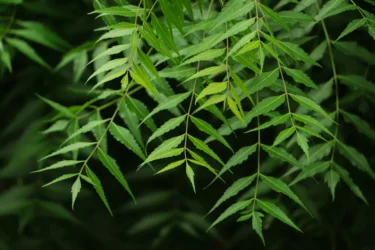
Some lab studies have shown that neem leaf extract could stop the growth of the dengue virus in animals. Therefore, neem leaves may be used to help deal with the infection3.
Boil some fresh neem leaves in water. Drinking this water may help you recover quickly. You can also drink the juice of neem leaf. To make neem juice, grind some fresh leaves with a cup of water. Strain this liquid in a cup and your juice is ready. You can add some honey or lemon juice to taste.
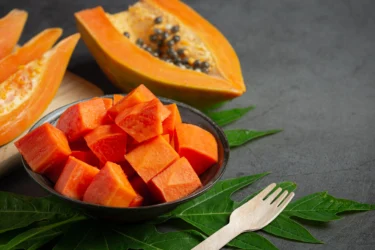
Papaya leaves have been used in traditional medicine for the treatment of dengue fever. The role of papaya leaves in managing dengue has been investigated. The results are promising, revealing that papaya leaf could help increase the platelet count, white blood cells and neutrophils in some individuals. Increased platelet count could help prevent bleeding, thereby preventing the progression of the disease3,4.
You can consume papaya leaf juice to help with the fever and restore normal platelet count. The juice is prepared by grinding fresh papaya leaves with a cup of water. Strain the liquid in a cup and papaya juice is ready to use.

Kalmegh, also known as Andrographis peniculata, is a medicinal herb effective in a range of disease conditions. For example, in lab trials, an extract of kalmegh showed antiviral activity against the dengue virus. Therefore, kalmegh may be used to help relieve dengue symptoms5.
You can drink kalmegh leaves or flowers, grind it and add it to a glass of water to make kalmedh juice.
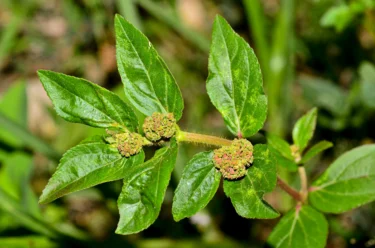
Asthma weed, known as Dudhi in Hindi, is an essential medicinal herb with many beneficial properties. It may help ease dengue fever and improve platelet count in people suffering from Dengue6.
To use dudhi, you need to boil the paste of Dudhi leaf in water. Reduce the water to 1/4th of its volume and consume as needed.
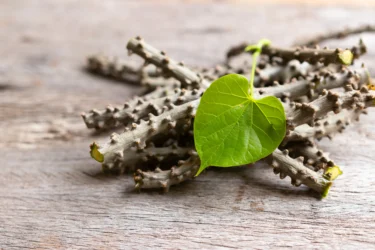
Guduchi or giloy is a common herb used as a remedy for many health conditions. Guduchi is proposed to boost the immune response and fight off viral infections in humans7.
You can drink Guduchi juice daily to help with the symptoms of dengue. Guduchi juice is made by blending freshly chopped Guduchi with a glass of water into a smooth consistency. Strain the blended mixture to remove any solids and your Guduchi juice is ready.
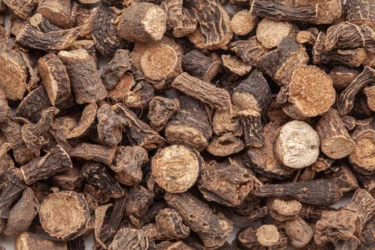
Golden eye grass or Kalimusli is a medicinal herb effective in many conditions. The roots and rhizomes of kalimusli are used in many disease conditions. Its use may boost the immune response.
Although, research is limited for its use, you can try taking kalimusli powder with milk to help fight off infection.
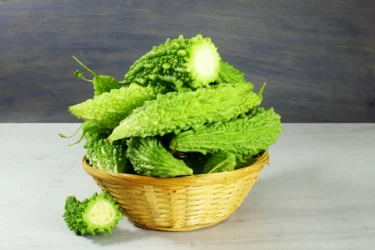
Momordica charantia, known as karela in Hindi and bitter gourd in English, possesses many health benefits. Karela extract has shown inhibitory action against the multiplication of dengue virus in lab studies3.
You can use karela as a vegetable and use it in foods and dishes. You can also make karela juice to help with dengue. To make karela juice, peel the skin, chop it into pieces, add a glass of water, and blend this mixture. Once it’s blended, strain the liquid. You can add more water to balance the taste, and your karela juice is ready.
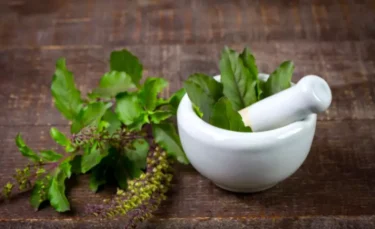
Basil, known as Tulsi in Hindi, is an aromatic herb native to tropical regions of Asia. Tulsi leaves have been used to manage dengue fever traditionally. Tulsi has antimicrobial properties and its protective action against the dengue virus has been observed in lab studies3.
For making tulsi tea, boil a few fresh tulsi leaves in water. Let it simmer for a while and strain it in a cup. You can add a few drops of lemon juice or a teaspoon of honey for taste.
Though some studies show the benefits of herbs and home remedies in Dengue, evidence is limited. Therefore, there is a need for large-scale human studies to establish the true extent of the benefits of these home remedies on human health. Thus, these should only be taken cautiously and never as a substitute for medical treatment.
One of the most important aspects of managing Dengue fever is hydration- the patient must take lots of oral fluids to maintain BP, as the most common complication of dengue is low BP.
Dr. M.G. Kartheeka, MBBS, MD (Pediatrics)
Also Read: Dengue: The Silent Threat of the Monsoon Season
You need to contact your healthcare specialist if you experience any symptoms of dengue.
However, if you notice any signs of dengue worsening, you must contact your nearest hospital or healthcare provider immediately2. These include the following:
It would be best if you did not rely on home remedies alone for dengue treatment. Consult a qualified doctor for advice as soon as you notice any symptoms, and continue the home remedies along with prescribed treatment or as suggested by your doctor.
Also Read: 10 Best Types of Tea to Relieve Cough and Cold
Dengue is an infectious disease spread through mosquito bites. If not treated in time, dengue can progress to a severe form of infection which can be fatal. There are some herbs like kalmegh, tulsi, neem, papaya leaves, dudhi and guduchi that you can use to relieve your symptoms at home. However, these herbs should not be used as an alternative to medical treatment provided by the doctor. If you or someone around you is suffering from dengue, reach out to your healthcare provider immediately. Taking timely treatment and precautions can help prevent the infection from getting worse.
Also Read: Natural Home Remedies for Chest Congestion
There are herbs that you can use to relieve symptoms of dengue. Herbs like neem, tulsi, kalmegh, karela, guduchi, dudhi, papaya and kalimusli can improve symptoms experienced in dengue. However, before using these herbs to relieve dengue, make sure you have consulted your healthcare provider. Dengue can get worse if not treated in time. Do not use any herbs or remedies without consulting your doctor.
You can use papaya and dudhi leaves to increase the platelet count in dengue. These leaves have shown improvement in the overall platelet count in the blood. However, you are advised not use them as alternate to medical treatment. Any herbal remedy for dengue should not be taken without consulting your healthcare provider first.
Timely treatment of dengue prevents it from progressing to a life-threatening stage. If you are experiencing symptoms of severe dengue infection such as blood in vomit and stool, stomach pain, extreme fatigue and nosebleed, head to the nearest hospital or clinic immediately.
1. Center for Disease Control: How Dengue Spreads [Internet]. [cited 2025 Jul 9] Available from: https://www.cdc.gov/dengue/transmission/index.html#:~:text=Through%20mosquito%20bites,to%20other%20people%20through%20bites.
2. New York City State: Department of Health [Internet]. [cited 2025 Jul 9] Available from: https://www.health.ny.gov/diseases/communicable/dengue_fever/
3. Abd Kadir SL, Yaakob H, Mohamed Zulkifli R. Potential anti-dengue medicinal plants: a review. Journal of Natural Medicines. Oct 2013;67(4):677. Available from: https://www.ncbi.nlm.nih.gov/pmc/articles/PMC3765846/
4. Sarala N, Paknikar S. Papaya extract to treat dengue: a novel therapeutic option?. Ann Med Health Sci Res. 2014;4(3):320-324. Available from: https://pmc.ncbi.nlm.nih.gov/articles/PMC4071726/
5. Ramalingam S, Karupannan S, Padmanaban P, et al. Anti-dengue activity of Andrographis paniculata extracts and quantification of dengue viral inhibition by SYBR green reverse transcription polymerase chain reaction. Ayu. 2018;39(2):87-91. Available from: https://pmc.ncbi.nlm.nih.gov/articles/PMC6369606/
6. Perera SD, Jayawardena UA, Jayasinghe CD. Potential Use of Euphorbia hirta for Dengue: A Systematic Review of Scientific Evidence. J Trop Med. 2018:2048530. Available from: https://pmc.ncbi.nlm.nih.gov/articles/PMC5926475/
7. Singh N, Yadav SS. Anti-dengue therapeutic potential of Tinospora cordifolia and its bioactives. Journal of Ethnopharmacology. 2024 Apr 26:118242. Available from: https://www.sciencedirect.com/science/article/abs/pii/S0378874124005415
8. Joshi RK, Agarwal S, Patil P, et al. Anti-Dengue Activity of Lipophilic Fraction of Ocimum basilicum L. Stem. Molecules. 2023;28(3):1446. Available from: https://pmc.ncbi.nlm.nih.gov/articles/PMC9921342/
Disclaimer: The information provided here is for educational/awareness purposes only and is not intended to be a substitute for medical treatment by a healthcare professional and should not be relied upon to diagnose or treat any medical condition. The reader should consult a registered medical practitioner to determine the appropriateness of the information and before consuming any medication. PharmEasy does not provide any guarantee or warranty (express or implied) regarding the accuracy, adequacy, completeness, legality, reliability or usefulness of the information; and disclaims any liability arising thereof.
More than 80 million people in India live with diabetes, and statistics say that more than 2 lakh people contract dengue every year1,2. Are you wondering why we are linking the two illnesses? Read on to know why.
It turns out that diabetes can worsen the complications caused by dengue, and now that winter is almost here, the dengue menace has shot up, too. If you are a diabetic, you should be extra cautious about mosquitoes this season, because dengue is more dangerous for you than for non-diabetics.
Dengue infection in patients with pre-existing diabetes is associated with significantly higher morbidity and mortality compared to non-diabetic individuals.
Evidence from Chennai shows that among dengue patients, approximately 30% had diabetes, and these patients were more likely to experience severe complications. Diabetic dengue patients frequently present with classical symptoms such as fever, vomiting, headache, muscle and body pain, but they are also prone to severe manifestations, including reduced urine output, bleeding tendencies, pedal oedema or ascites (swelling in feet or stomach), pleural effusion (fluid in lungs), and altered sensory stimulation. Blood abnormalities such as anaemia, thrombocytopenia, and leucocytosis (reduced red blood cells and platelets and increased white blood cells, respectively) are more pronounced in diabetic patients, contributing to worse outcomes3.
A prospective study further demonstrated that dengue-infected individuals with diabetes exhibit elevated inflammatory markers (CRP, Endocan, IL-8, and perfusion index). This indicated a heightened inflammatory response that can further increase blood sugar levels and the risk of severe dengue and bleeding disorders4.
It has been shown that in some diabetes patients, dengue caused very severe complications. They may suffer from respiratory problems, persistent vomiting, sore throat that makes swallowing difficult and continuous coughing. Also, intense abdominal pain, extremely high fever and splitting headaches may be higher in diabetics with increased chances of developing Dengue Haemorrhagic Fever (DHF). DHF is a more serious form of dengue, with bleeding tendencies, a low platelet count, and possible damage to the circulatory system5,6.
Blood glucose is an important factor for viral replication, and it basically facilitates virus transmission in mosquitoes, dengue causes fever and increases metabolic rate, which can lead to a rise in fluctuation in blood sugar levels, strict monitoring is very critical.
Dr Ashish Bajaj, M.B.B.S., M.D. in Clinical Pharmacology and Toxicology
In cases of dengue in non-diabetics, patients may experience no symptoms, mild symptoms, or severe symptoms. These classical dengue symptoms may include headaches, rashes, low white blood cell levels, nausea, weakness and of course fever. As mentioned above, sometimes dengue may be very severe, increasing blood vessel wall permeability (bleeding tendency), causing the condition Dengue Haemorrhagic Fever (DHF). This condition is more common and likely to progress in diabetics6.
As this condition progresses, it may go on to something called Dengue Shock Syndrome. This is characterised by the same symptoms of internal haemorrhage, low pulse, change in mental state, and change in blood pressure that happen with DHF. Additionally, dengue shock syndrome results in multiple organ failures, failure in the circulatory system and a high risk of death7.
Overall, these findings show that diabetes significantly amplifies the severity and complications of dengue, underscoring the critical need for vigilant monitoring, prompt intervention, and individualised care in diabetic patients during dengue outbreaks.
Pathologically, dengue is characterised by high levels of inflammatory markers like CRP, endocan and IL-8. Thus, the dengue could be more fatal in patients that have co-morbid conditions of inflammation such as in diabetes.
Dr. M.G. Kartheeka, MBBS, MD(Pediatrics)
There is not enough evidence that tell us why diabetes makes dengue more dangerous. But doctors believe that since a person with diabetes has weak immunity, fragile blood vessels, and a higher risk of haemorrhage, symptoms of dengue tend to worsen in diabetics7. Dengue destroys a person’s platelets, which may lead to blood clotting. Together, diabetes and dengue cause a lot of damage inside the body and make it difficult for the diabetic to recover6.
Winter, especially the beginning of winter, is when dengue incidents peak. Here are a few things that diabetics can do9:
Also Read: 5 Effective Preventive Measures for Dengue
If you have diabetes, you have to be extra careful about mosquitoes. Follow the precautions mentioned above to stay healthy and safe.
Diabetes greatly increases the risk of severe complications and poor outcomes in dengue. This makes early detection, close monitoring, and timely management especially vital for diabetics who get dengue symptoms. Although prompt identification and medical therapy are cornerstone of management, the importance of prevention cannot be overlooked especially during periods of outbreaks.
Also Read: Dengue: The Silent Threat of the Monsoon Season
Disclaimer: The information provided here is for educational/awareness purposes only and is not intended to be a substitute for medical treatment by a healthcare professional and should not be relied upon to diagnose or treat any medical condition. The reader should consult a registered medical practitioner to determine the appropriateness of the information and before consuming any medication. PharmEasy does not provide any guarantee or warranty (express or implied) regarding the accuracy, adequacy, completeness, legality, reliability or usefulness of the information; and disclaims any liability arising thereof.
Links and product recommendations in the information provided here are advertisements of third-party products available on the website. PharmEasy does not make any representation on the accuracy or suitability of such products/services. Advertisements do not influence the editorial decisions or content. The information in this blog is subject to change without notice. The authors and administrators reserve the right to modify, add, or remove
Dengue fever is a mosquito-borne viral illness commonly seen in tropical and subtropical regions. It is caused by the dengue virus, which is transmitted primarily by the Aedes aegypti mosquito. These mosquitoes are most active during the early morning and late afternoon hours and are known as day-biting mosquitoes1.
Dengue spreads when a mosquito bites a person infected with dengue and then transmits the virus to another person through subsequent bites. The disease can cause a range of symptoms such as high fever (up to 104°F), intense joint and muscle pain, pain behind the eyes, nausea, vomiting, severe headaches, and fatigue1,2.
Dengue progresses through three phases:
Currently, there is no widely available dengue vaccine, although some vaccines like Dengvaxia (CYD-TDV) have been approved in certain countries for people who have had a dengue infection. Another vaccine, Qdenga (TAK-003), has also been approved in select regions but is not yet widely available in India3.
Given the limited availability of effective vaccines and the absence of targeted antiviral treatments for dengue, prevention remains the most effective approach for dengue management. Focusing on ways to avoid mosquito bites and reduce mosquito breeding can play a key role in protecting yourself and your community from this serious illness.
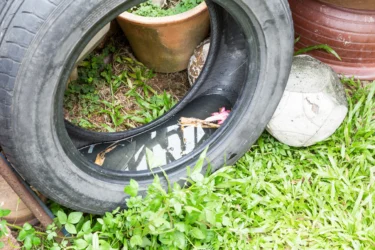
The mosquitoes that spread dengue breed in stagnant water found in everyday objects such as discarded tyres, plastic containers, flowerpots, septic tanks, and pet water bowls. Reducing the available habitat for these mosquitoes by regularly clearing out standing water can help prevent dengue. Since Aedes mosquitoes prefer clean, stagnant water to lay eggs in, it is important to clean potential breeding areas at least once a week3.

The mosquitoes responsible for spreading dengue are most active around dawn and dusk. To keep them out, fit your doors and windows with fine mesh screens. Make sure the screens have no holes and keep them closed during peak mosquito hours4.
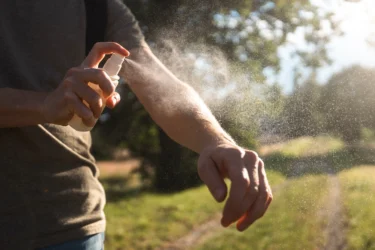
Using mosquito repellents is essential, especially in tropical regions or crowded areas where the risk of bites is higher. Apply creams or sprays containing 10–30% DEET, picaridin, or IR3535 when travelling or even while indoors5. For children and infants, opt for mosquito patches, bands, or wipes from reputable brands. Avoid applying repellents directly to their hands or face.
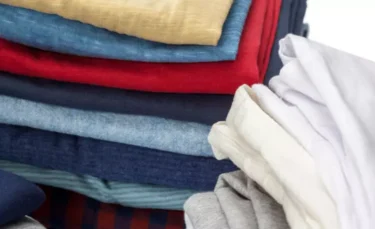
To reduce the risk of mosquito bites, wear long-sleeved clothing, full-length trousers, socks, and covered shoes, especially in areas where dengue is common. Light-coloured clothing is recommended, as dark colours tend to attract mosquitoes3.
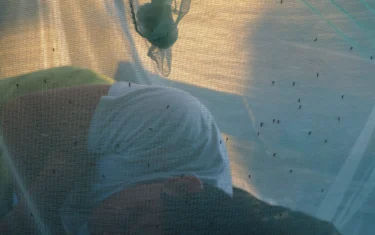
Sleeping under the mosquito net can provide an extra layer of protection from mosquito bites for you and your children6.
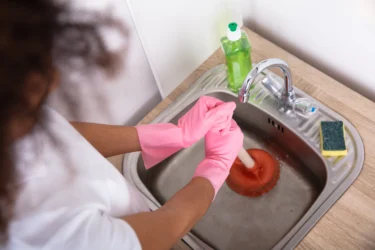
Clean and unclog drains, roof gutters, and water pipes around your home regularly. Cover all vessels and drums that are used to store water. These areas can collect stagnant water, creating breeding grounds for mosquitoes7.

Mosquitoes often gather in dark, damp areas, so keeping your home well-lit and well-ventilated can help reduce mosquitoes in the house. Allow natural sunlight into your rooms and ensure proper airflow. Lighting camphor in a closed room for about 30 minutes on alternate days may help repel insects; however, this should not be used as a substitute for proven mosquito prevention measures.

Dengue fever isn’t limited to indoor environments, it can also occur outdoors, such as during camping trips on humid days or walks in wooded areas after rainfall. Plan your outings according to the weather and carry essential mosquito protection with you, including repellent creams, long-sleeved clothing, and netted sleeping bags. Taking these precautions can help reduce your risk of mosquito bites when you’re outside8.
Seek immediate medical attention if you or a family member has a high-grade fever (around 40°C) accompanied by warning signs such as bleeding gums or nose, severe abdominal pain, or vomiting more than three times in 24 hours. These symptoms may indicate a serious form of dengue requiring urgent care.
Consult a doctor promptly if you suspect dengue. A healthcare professional can confirm the diagnosis through blood tests and rule out other possible causes. If someone in your household is affected, the risk of others getting infected increases, as mosquitoes can transmit the virus from one person to another. Thus, prevention is still the best defence against dengue. By adopting the simple, practical steps listed above, you can significantly reduce your risk of contracting dengue and help protect your family and community.
Also Read: Dengue: The Silent Threat of the Monsoon Season
Disclaimer: The information provided here is for educational/awareness purposes only and is not intended to be a substitute for medical treatment by a healthcare professional and should not be relied upon to diagnose or treat any medical condition. The reader should consult a registered medical practitioner to determine the appropriateness of the information and before consuming any medication. PharmEasy does not provide any guarantee or warranty (express or implied) regarding the accuracy, adequacy, completeness, legality, reliability or usefulness of the information; and disclaims any liability arising thereof.